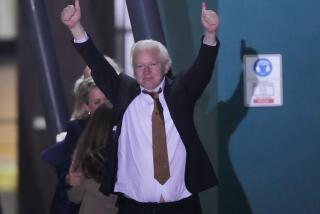Julian Assange’s lawyer says Sweden’s prime minister has made fair hearing impossible
Reporting from London — A lawyer for WikiLeaks founder Julian Assange on Friday accused Sweden’s prime minister of creating a “toxic atmosphere” that made a fair hearing for his client on sexual-abuse allegations impossible.
Attorney Geoffrey Robertson told a London courtroom that recent comments by Swedish Prime Minister Fredrik Reinfeldt had turned Assange into “public enemy No. 1” in the Scandinavian nation. Reinfeldt had gone on record sharply criticizing attempts by Assange’s defense team to discredit his country’s legal system.
Assange, 39, is fighting extradition to Sweden, where prosecutors want to question him regarding accusations by two women who say he molested and raped them on separate occasions in August. Assange says the encounters were consensual.
Legal arguments in the extradition hearing wrapped up Friday, with the judge expected to issue a decision Feb. 24.
The proceedings have frequently been acrimonious, with Assange’s lawyers contending that he is the object of a politically motivated smear campaign and accusing Swedish authorities of procedural mistakes and ideological vendettas in their pursuit of him.
But Clare Montgomery, arguing on the prosecutors’ behalf, said Reinfeldt’s remarks and the intense news media attention were prompted by interviews and public statements made by Assange’s own legal team.
When someone “has created a firestorm, they can’t be surprised if they get burned,” Montgomery said. She denied that the media hype had created a prejudicial legal environment.
Assange, who is Australian, was arrested in London in December after surrendering to police on a European arrest warrant. For most of the last two months, he has been free on a restricted bail that allows him to stay at a friend’s mansion in the English countryside but requires him to wear an electronic monitoring device.
He fears that extradition to Sweden would be a pretext and that he could then be sent to the United States, where officials have called for him to be punished for publishing thousands of U.S. military and diplomatic documents on his website.
Although the judge’s decision on extradition to Sweden is expected in about two weeks, it could be months before the matter is resolved. Whoever loses this round is likely to appeal, a process that could eventually reach Britain’s highest court.
Stobart is a staff writer in The Times’ London Bureau.
More to Read
Sign up for Essential California
The most important California stories and recommendations in your inbox every morning.
You may occasionally receive promotional content from the Los Angeles Times.











